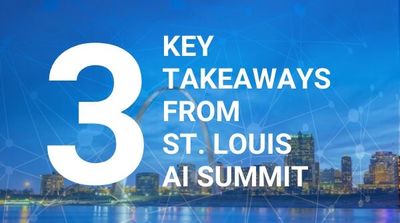
On January 30, 2020, Venture Café hosted AI Summit 2020, bringing together thought leaders from across the St. Louis, Missouri, area to discuss today’s most pressing issues related to artificial intelligence (AI). Themes included operationalizing AI ethics, geospatial opportunities, and local economic sustainability in light of this emerging technology.
Here are our 3 key takeaways from the summit:
1. We are beyond the hype
In the not-so-distant past, AI was heralded as the solution to nearly every business challenge. Today’s practitioners are encouraging a “back-to-basics” approach. For example, geospatial data is being incorporated in myriad subtle ways that people don’t even realize, explained Object Computing CEO, Bob Elfanbaum. “It’s converging with everything from agriculture to healthcare. As the world becomes more digitized, we create petabytes of data,” Elfanbaum said. But, not all data is created equally, and anomalies can interfere with automated decision-making. For this reason, AI practitioners must still apply their (human) critical thinking skills. While it's undeniable that AI has opened up a wealth of promising opportunities, we cannot overlook the importance of AI safety principles and ethics.
2. “Smart cities” already exist, and Saint Louis is one of them
Dr. Robert Gaskill-Clemons, Chief Technology Officer for the City of St. Louis, shared the results of a recent pilot project launched by the city to enhance public safety and efficiency of operations across all city departments. Through this pilot, city officials researched, designed, and tested Smart City Interoperability Reference Architecture (SCIRA), an interoperable framework that integrates Internet of Things (IoT) sensors for public safety applications at the community level. “The results were positive,” said Gaskill-Clemons, “But, you might be surprised by how quickly something that seems relatively simple becomes complex when you expand it to a citywide scale.” Traffic lights, for example, are programmed based on historic traffic patterns at specific times of day. When an unpredictable event occurs, such as an accident, the impact on traffic flow can be significant. The next step, explained Gaskill-Clemons, is to consider the integration of devices, such as wearables for first responders, which could temporarily influence traffic light patterns to improve traffic flow. As an added benefit, such devices could also possibly improve life-saving efforts by alerting nearby hospitals of incoming patients.
3. Ethics in AI is imperative
On March 18, 2018, a Phoenix, Arizona resident named Elaine Herzberg was tragically struck by a self-driving car, becoming the first recorded case of a pedestrian fatality involving an autonomous vehicle. When sensor failures like this occur, questions of liability are brought to the forefront, creating a new level of legal and ethical complexity. In concert with ongoing concerns regarding robotic automation, AI has also brought heightened anxiety about job loss and unemployment in both industrial and non-industrial settings as machines are programmed to take over tasks currently performed by human workers. Finally, concern regarding data bias must be alleviated before widespread use of certain AI-driven tools can be implemented. For example, in 2014, Amazon developed a recruiting tool for identifying software engineers. The system was found to discriminate against women, and the company abandoned it in 2017. As a society, and as business leaders, it is our duty to apply responsible AI and keep ethics at the forefront of our technology decisions as we develop "thinking machines" moving forward.
Catch up with us at other events locally and around the globe!
